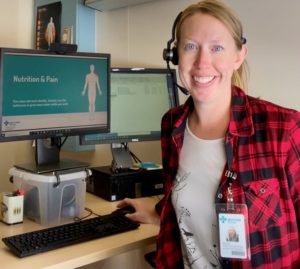In a world filled with hype about super foods, extreme diets, and so-called “bad” foods, a Crowsnest Pass dietitian maintains: “if it sounds too good to be true, it probably is.”

— Photo supplied by Leslie Prenoslo
Leslie Prenoslo, who has worked as a registered dietitian for a decade, has seen nutrition fads come and go and maintains that balance is the key when it comes to eating well.
“Our … society always wants to label things as good or bad, or gives us these magic bullets,” said Prenoslo, who works for Alberta Health Services out of the Crowsnest Pass Health Centre in Blairmore.
She recommends “taking a step back … and realizing that all foods are part of a healthy diet.”
Rather than grasping for quick fixes, Prenoslo recommends people take a look at their eating habits and ask themselves what’s driving the hunger.
“We eat for so many different reasons and that’s such a normal human thing to do. That’s not a bad thing, but recognizing ‘is this emotion something like stress or boredom? Am I actually physically hungry or am I just craving a certain texture like the crunch or something?’
“That’s what we would do with clients, and there are some classes on it as well. It’s just understanding all those other pieces that [play into] what we are eating.”
“We eat for so many different reasons and that’s such a normal human thing to do. That’s not a bad thing, but recognizing ‘is this emotion something like stress or boredom? Am I actually physically hungry or am I just craving a certain texture like the crunch or something?’”
— Leslie Prenoslo, a registered dieititian who works in the Crowsnest Pass
For some, nutrition has taken a back seat during the pandemic and bad habits may have translated into weight gain, blood sugar changes, and other health impacts.
“We know stress generally affects nutrition and what we eat,” said Prenoslo. “It comes up a lot [around the pandemic about] how people have been reaching for comfort foods. They’re eating more. They’re eating differently. And there have been activity changes.”
For rural Albertans who need nutritional advice, access to nutrition information has never been easier. COVID-19 may have limited in-person appointments and group sessions, but dietitians, like other health professionals, have filled their calendars with virtual appointments and phone counselling for individuals and virtual group programming.
“I think the positive of [the move online] is people can really pick what works for them and their schedule and where they are,” said Prenoslo. “You can book in any little town in the province or wherever you are. You can join any of the classes going on.”
Online group classes are offered throughout the province to anyone wanting to manage weight or diabetes, deal with picky eaters, and learn nutrition tips to reduce heart disease among many other topics. Prensolo said these classes give rural Albertans more options than were offered before the pandemic when a particular course may have only been available in-person in a specific area where it was only feasible for locals to attend.
Dietitians can also offer online one-on-one appointments to clients in areas outside their communities.
“I think the positive of [the move online] is people can really pick what works for them and their schedule and where they are. You can book in any little town in the province or wherever you are. You can join any of the classes going on.
— Leslie Prenoslo, registered dietitian
Prensolo said participant feedback in the virtual group sessions has been positive since the technology offers options for people who want to be part of the conversation including use of the chat box or their microphones to comment.
Other participants are content to listen and take in the information from the sidelines, she added.
Switching to online platforms had some early challenges for dietitians who often shared resources with their in-person clients for further reference. With more information accessible online and the ability to email or mail resources to clients, dietitians have found other ways to make sure clients have access to needed information.
“[Virtual interactions are] so different than being in person, but we adapted and got the hang of it.”
Nevertheless, some older individuals, others who were uncomfortable with technology, or those who preferred in-person appointments may have stayed away due to COVID-19 concerns.
“Hopefully, one day we’ll be through the pandemic and can get back to offering all options,” Prenoslo said, adding that rural Albertans don’t need a physician referral to see an AHS dietitian.
“I think that we will continue to ask [clients] when they’re booking ‘what works for you? Do you prefer [online or] a phone call or do you want to come in?
“I think we have … learned the value of [options.] So, I don’t think we will lose the virtual.”
For more information on nutrition and programs available throughout the province, visit AHS. Nutrition Month information is available through the Dietitians of Canada.
